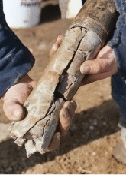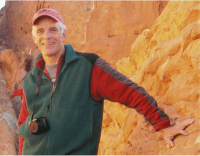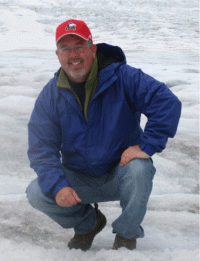On-Demand Webinars
ROCK CORE LOGGING FOR HYDROGEOLOGIC PROJECTS:
Assessing Recovery, RQD, Fractures and Stratigraphy
This 90-minute webinar is designed to demystify the confusion associated with measuring rock core recovery and RQD while characterizing stratigraphy and fractures in rock cores.
Confusing methods, conflicting terms, and variations of published techniques have caused professionals to log core inconsistently and sometimes, incorrectly. The contrasting differences between geotechnical applications and hydrogeologic purposes have also contributed to different logging styles and methods that have resulted in insufficient information for hydrogeologic projects.
Learn to log and describe rock core in order to take the mystery out of the subsurface.
We have assembled many of the geographic differences in rock coring terms and designed a webinar that presents these common difficulties along with methods that helps take the mystery out of the subsurface.
This webinar will cover the following topics:
- Measuring core recovery and Rock Quality Determination (RQD)
- Identifying natural core breaks from drilling breaks
- Identifying the importance and application of water loss during coring and drilling
- Photographing rock core and placing and labeling rock cores in the box
- Describing rock cores of various rock types
- Giving context to rock cores by building the litho- and hydrostratigraphic framework
- Assessing fracture networks from rock cores and understanding the story that rock cores are telling
Geologic context is key for success with logging both sediments and rock. In this webinar, we will also present up-to-date procedures for building the hydrogeologic framework during the field activities and their importance and benefits.

Characterizing fractures is good, but understanding their context and distribution is a key for confident characterization. This webinar presents the common elements for providing that context.
PLUS! We will present a 15-minute summary of useful downhole tools and their recent updates. Flow meter technology, high-resolution temperature distribution using fiber optics, and both acoustic and optical televiewers are advancing and becoming easier to use from year to year. Discover how to use these modern technologies and choose what is best for your projects
Instructor Bio
Kenneth Bradbury, PhD, PG
 Dr. Kenneth Bradbury Dr. Kenneth Bradbury is Wisconsin's State Geologist and Director of the Wisconsin Geological and Natural History Survey, UW-Madison Division of Extension. Ken is a hydrogeologist who has worked and published on groundwater issues in Wisconsin since 1982, with a focus on applied problems. His research has included investigations of virus transport in groundwater, groundwater flow in fractured rocks, aquitard hydrogeology, groundwater recharge processes, wellhead protection, regional groundwater simulation, and the hydrogeology of glacial deposits. He received his B.A. from Ohio Wesleyan University, where he majored in geology, then earned a Master's degree from Indiana University. He received his PhD from the UW-Madison Department of Geology in 1982. Ken is an affiliate faculty member in the UW-Madison Department of Geoscience and the Nelson Institute at UW-Madison. He is a Fellow in the Geological Society of America and is active in the Association of American State Geologists. Ken has served on the Water Science and Technology Board of the National Academy of Sciences and on committees advising the US Geological Survey.
Dan Kelleher, PG, CIPM
 Dan Kelleher Dan Kelleher is a hydrogeologist who strives for excellence in subsurface characterization. Dan earned his bachelor's degree from Monmouth College and master's degree at Northern Illinois University. His technical expertise is quantitative hydrogeology (in porous and fractured media), geotechnical analysis of sedimentary sequences, aquifer testing and predictive ground water modeling. He promotes field analysis during stratigraphic characterization from boring to boring in order to utilize QA/QC processes fully throughout a project and help identify unexpected conditions as soon as they arise.
| Fee: |
299.00 USD Per Webinar
|
| Materials and Downloads: |
Session Slides (PDF)
Record of Attendance Form (PDF)
|
Number of
Participants: |
AS OF JUNE 1, 2020, WEBINARS ARE PRICED FOR INDIVIDUALS WORKING ALONE. Pricing is discounted for individual registrations for people working alone.
|
Continuing
Education
Certificates: |
$14.95 each. Official CEU certificates are available as an option. After successful completion of this webinar, a link will be provided to order a certificate.
|
| Access: |
On-demand, anytime 24/7. |
| Discounts: |
Buy 3 on-demand webinars, and get 3 on-demand webinars for free!
|
| Duration: |
90 minutes |
| PDH Earned: |
1.5 hours |
| MA LSP: |
1.5 hours (MA LSP No. 1417-B) |
| |
|
| Instructor(s): |
Ken Bradbury, Ph.D., PG, Program Leader and Hydrogeologist at the Wisconsin Geological Natural History Survey and
Dan Kelleher, PG, CIPM, Author of the FIELD GUIDE FOR ROCK CORE LOGGING AND FRACTURE ANALYSIS |
|
Become A Member
It's Free, It's Easy and as a
Member you'll enjoy...
- Exclusive Videos
- Special Pricing
- And Much More
|
|
Join
|
Learn More
|
Association of Environmental
& Engineering Geologists
|